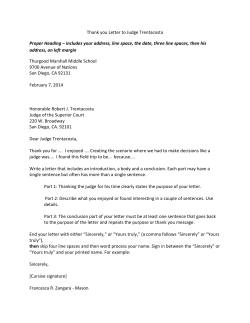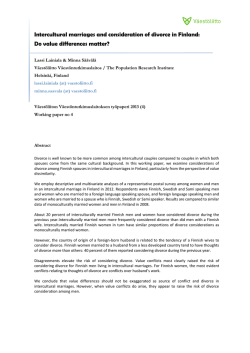
to see Divorce and Stress Pamphlet
• Call Cuyahoga County Alcohol Drug Abuse & Mental Health Services Board for a list of agencies that could be of help: 216-241-3400. http://adamhscc.org Divi sio IO OH - AH • Outreach peer support “Warmline” 440-886-5950. http://spectrum-support.org CUY • Suicide Prevention/Mental Health Crisis Hotline: 216-623-6888 or National Hotline: 1-800-784-2433. http://adamhscc.org GA COUNT IO COUNT Y DIVORCE AND STRESS O GA - AH f Domestic R e no OH CUY O • Domestic Violence and Child Advocacy Center: 216-391-HELP (4357) for emergency help. Office: 216-229-2420. http://dvcac.org/ ions lat • 2-1-1 is a United Way link to health and human services agencies. http://211cleveland.org/ f Domestic R e no ions lat Divi sio Who to contact for help? Y DIVISION OF DOMESTIC RELATIONS COURT OF COMMON PLEAS CUYAHOGA COUNTY, OHIO Guidance from Cuyahoga County Domestic Relations Court 1 W LAKESIDE AVENUE CLEVELAND, OHIO 44113-1083 216-443-8800 • Child Abuse Hotline: 216-696-KIDS (5437). http://cfs.cuyahogacounty.us • Women In Transition, Tri-C, 216-987-4868 http://www.tri-c.edu/women-in-transition • For private counseling, please access a list of Providers from your health insurance carrier. We cannot recommend specific treatment Providers. http://domestic.cuyahogacounty.us Leslie Ann Celebrezze, Judge Rosemary Grdina Gold, Judge Francine B. Goldberg, Judge Cheryl S. Karner, Judge Diane M. Palos, Administrative Judge 1232 The mission of the Cuyahoga County Domestic Relations Court is to help families restructure their lives by reaching compassionate and just resolutions to parenting and property disputes. DIVORCE AND STRESS The decision to end a marriage is an important life decision that can become complicated by legal, financial, and parenting issues. Sometimes going through a divorce can result in a variety of negative emotions that not only affect parents, but also affect children, grandparents, friends, and extended family. Going through a divorce can lead you to question everything in your life, including your own identity and your ability to cope by yourself. Divorce highlights your fears and sensitivities, so old wounds from the past could resurface. You may need to recover your confidence and self-esteem. We want to offer some coping techniques to help you take care of yourself and others. Guidance from Domestic Relations Court • Consider joining a support group, (some religious organizations may provide support groups) or participating in mediation. This can lead to better communication and fewer confrontations. • Rather than withdrawing socially, surround yourself with friends that are a positive influence and do not reinforce your pain or other negative emotions. • Make sure you pay attention to your emotional needs and do things that will nurture you emotionally and physically (keep yourself physically fit, set aside time for yourself, maintain a balance of giving and receiving). • “WPT”: Don’t worry about What other People Think. • Prioritize what needs to get done and in what order and then break tasks down to smaller steps to keep your goals manageable. • If you have been a stay-at-home mother or father and out of the workforce for some time, you may have to look at going back to school for training in a marketable skill. • Work towards forgiveness and moving on. Don’t deny your anger, but don’t let it drain your energy by getting stuck in resentment. The best “revenge” is your success and happiness. • Let go of problems that are beyond your control. • Don’t make important decisions when emotions are high. How to help your children • Give them as much reassurance as possible. Keep telling them that they are not responsible for the break-up. • Talk over what is happening in an age-appropriate way, but leave out specific adult details. • Do not expose them to parental/spouse conflict. • Be open to their questions and encourage them to talk about their feelings, but don’t force them to talk. • Encourage relationships with both parents, don’t criticize the other parent, don’t demand exclusive loyalty, or use them to hurt your expartner. • Avoid looking to your children for support or guidance. • Maintain normal household routines as much as possible. • Look for signs of distress: increasingly clingy behavior; tantrums; fear of separation; anxiety at bedtime; generalized worries and fears; changes in eating and sleeping patterns; regressive behavior (thumb sucking, bed-wetting); headaches/stomachaches; increased anger/defiance; withdrawal; sadness; loss of interest in activities; school/academic problems; perfectionism; or any changes in mood or behavior not normal for your child or teenager. • To reduce conflict around holidays, keep expectations realistic, don’t make children choose where to spend their holiday time. • Parents should not try to outdo each other with presents or other indulgences.
© Copyright 2025





















